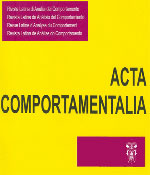Autonomous learning: Developing a definition
Main Article Content
Abstract
The new Technologies and the rapid advance of knowledge highlight the relevance of adaptation to this changing context, and the objective of being able to learn by oneself throughout life. Learner tasks considered as autonomous would include solving problems by oneself, raising new ones, and any activity carried out without the presence or collaboration of others. However, beyond these examples, there has been no behaviouristic development of the criteria for indentifying a type of learning as autonomous and distinguishing it from another, non-autonomous type. The present work aims to delimit this notion, doing so within a behavioural theoretical and epistemological framework. Assuming that the use of a term establishes its meanings, we analyze the way the term autonomous learning is normally employed, and derive several relevant aspects. This leads to a notion based on different dimensions, which, moreover, permit the consideration of a wide range of cases of autonomous learning.
Article Details
Citas en Dimensions Service

<a rel="license" href="http://creativecommons.org/licenses/by-nc-sa/4.0/"><img alt="Licencia de Creative Commons" style="border-width:0" src="https://i.creativecommons.org/l/by-nc-sa/4.0/88x31.png" /></a><br />Este obra está bajo una <a rel="license" href="http://creativecommons.org/licenses/by-nc-sa/4.0/">licencia de Creative Commons Reconocimiento-NoComercial-CompartirIgual 4.0 Internacional</a>.
